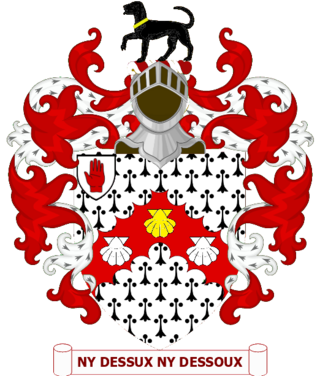
The Admiralty was a department of the Government of the United Kingdom responsible for the command of the Royal Navy until 1964, historically under its titular head, the Lord High Admiral – one of the Great Officers of State. For much of its history, from the early 18th century until its abolition, the role of the Lord High Admiral was almost invariably put "in commission" and exercised by the Lords Commissioner of the Admiralty, who sat on the governing Board of Admiralty, rather than by a single person. The Admiralty was replaced by the Admiralty Board in 1964, as part of the reforms that created the Ministry of Defence and its Navy Department.

The First Sea Lord and Chief of the Naval Staff (1SL/CNS) is the military head of the Royal Navy and Naval Service of the United Kingdom. The First Sea Lord is usually the highest ranking and most senior admiral to serve in the British Armed Forces unless either the Chief or Vice-Chief of the Defence Staff are naval officers. Admiral Ben Key was appointed First Sea Lord in November 2021.

Baron Hotham, of South Dalton in the County of York, is a title in the Peerage of Ireland. It was created in 1797 for the naval commander Admiral William Hotham, with remainder to the heirs male of his father. Hotham was the third son of Sir Beaumont Hotham, 7th Baronet, of Scorborough, and in 1811 he also succeeded his nephew as eleventh Baronet. Lord Hotham never married and on his death in 1813 he was succeeded in both titles by his younger brother Beaumont, the second Baron and twelfth Baronet. He had previously represented Wigan in the House of Commons.

Admiral of the Fleet Edward Russell, 1st Earl of Orford, PC was a Royal Navy officer and politician. After serving as a junior officer at the Battle of Solebay during the Third Anglo-Dutch War, he served as a captain in the Mediterranean Sea in operations against the Barbary pirates.
In the United Kingdom, the Judge Advocate General and Judge Martial of all the Forces is a judge responsible for the court-martial process within the Royal Navy, British Army and Royal Air Force. As such the post has existed since 2008; prior to this date the Judge Advocate General's authority related to the Army and the RAF while the Judge Advocate of the Fleet was the equivalent with regard to the Royal Navy.

Josiah Burchett, of Hampstead, Middlesex, was a British naval administrator and Whig politician, who sat in the English and British House of Commons between 1705 and 1741. He was Secretary of the Admiralty in England, a position he held for almost fifty years from 26 September 1694 to 14 October 1742. In addition to his administrative duties, he was the author of the first general history of the Royal Navy, published in 1720 and based on official Admiralty records.

Admiral of the Fleet George Byng, 1st Viscount Torrington,, of Southill Park in Bedfordshire, was a Royal Navy officer and statesman. While still a lieutenant, he delivered a letter from various captains to Prince William of Orange, who had just landed at Torbay, assuring the Prince of the captains' support; the Prince gave Byng a response which ultimately led to the Royal Navy switching allegiance to the Prince and the Glorious Revolution of November 1688.
Sir John Ernle was an English politician who sat in the House of Commons at various times between 1654 and 1695. He was one of the longest-serving Chancellors of the Exchequer, a position he held from 2 May 1676 to 9 April 1689.
Sir Reginald Brodie Dyke Acland was a British barrister and judge.

Sir Edward Cust, 1st Baronet, KCH was a British soldier, politician and courtier.

Sir Thomas Frazer Grove, 1st Baronet was an English Liberal politician who sat in the House of Commons between 1868 and 1892.

The Permanent Secretary of the Admiralty was the permanent secretary at the Admiralty, the department of state in Great Britain responsible for the administration of the Royal Navy. He was head of the Admiralty Secretariat, later known as the Department of the Permanent Secretary. Although he was not a Lord Commissioner of the Admiralty, he was as a member of the Board, and did attend all meetings. The post existed from 1702 to 1964.
Thomas Phinn, QC was a British barrister and Liberal Party politician. He held various positions in the Admiralty of the United Kingdom in the mid-19th century.

Sir William Fortescue of Buckland Filleigh, Devon, was a British judge and Master of the Rolls 1741–1749.

The First Lord of the Admiralty, or formally the Office of the First Lord of the Admiralty, was the political head of the English and later British Royal Navy. He was the government's senior adviser on all naval affairs, responsible for the direction and control of the Admiralty, and also of general administration of the Naval Service of the Kingdom of England, Great Britain in the 18th century, and then the United Kingdom, including the Royal Navy, the Royal Marines, and other services. It was one of the earliest known permanent government posts. Apart from being the political head of the Naval Service the post holder was simultaneously the pre-eminent member of the Board of Admiralty. The office of First Lord of the Admiralty existed from 1628 until it was abolished when the Admiralty, Air Ministry, Ministry of Defence and War Office were all merged to form the new Ministry of Defence in 1964. Its modern-day equivalent is the Secretary of State for Defence.
Sir Richard Budden Crowder, QC was a British Liberal Party politician and judge.

Sir Thomas Dyke, 1st Baronet was an English Tory politician who sat in the House of Commons between 1685 and 1698.

During the early 17th century, England's relative naval power deteriorated, In the course of the rest of the 17th century, The office of the Admiralty and Marine Affairs steered the Navy's transition from a semi-amateur Navy Royal fighting in conjunction with private vessels into a fully professional institution, a Royal Navy. Its financial provisions were gradually regularised, it came to rely on dedicated warships only, and it developed a professional officer corps with a defined career structure, superseding an earlier mix of sailors and socially prominent former soldiers.

The Glorious Revolution of 1688 rearranged the political map of Europe, and led to a series of wars with France that lasted well over a century. This was the classic age of sail; while the ships themselves evolved in only minor ways, technique and tactics were honed to a high degree, and the battles of the Napoleonic Wars entailed feats that would have been impossible for the fleets of the 17th century. Because of parliamentary opposition, James II fled the country. The landing of William III and the Glorious Revolution itself was a gigantic effort involving 100 warships and 400 transports carrying 11,000 infantry and 4,000 horses. It was not opposed by the English or Scottish fleets.

The Counsel to the Navy Department, Ministry of Defence originally called Counsel to the Navy Board was an appointed legal adviser to the Royal Navy from 1673 to 1995.













